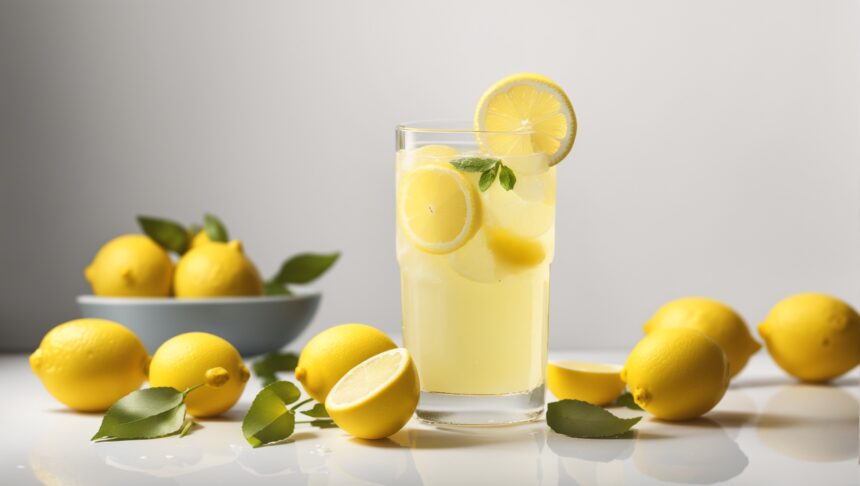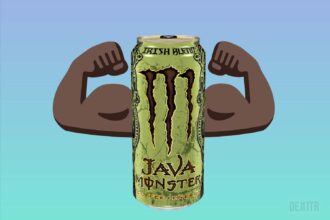So, does lemonade offer you a dose of Vitamin C? Lemons are known to be loaded with this vital nutrient, so it’s only natural to wonder if your lemonade retains it. The truth? It does have Vitamin C, but—and it’s a big but—it might not be as much as you’d hope.
Lemonade does contain Vitamin C, but the amount can be minimal in store-bought versions due to the pasteurization process, which degrades the vitamin. Homemade lemonade made from fresh lemons will likely have higher Vitamin C content, offering a more nutritious option.
Keep reading to discover why lemonade isn’t an optimal source of vitamin C, how much of this vitamin it actually contains, and explore better alternatives to ensure you’re receiving sufficient vitamin C.
Why Does Lemonade Have Very Minimal Vitamin C?
You’re wondering why store-bought lemonade has such a minuscule amount of Vitamin C, right? It’s mainly due to the pasteurization process. This method, where the lemonade is heated and then rapidly cooled, kills any bacteria and extends the drink’s shelf life.
However, Vitamin C, a water-soluble vitamin sensitive to heat, light, and air, loses its stability during this process.
Now, when lemonade undergoes pasteurization, it’s subjected to high temperatures and exposure to oxygen, both of which are unsuitable for Vitamin C.
The exposure to these elements leads to the breakdown and degradation of this essential nutrient.
So, while you’re reaching for that seemingly refreshing bottle of lemonade from the store shelf, dreaming of Vitamin C goodness, you might not be getting the nutritional bang for your buck that you hoped for.
Wondering about the shelf life of other mixtures? Find out how long coffee with milk lasts in the fridge to manage your beverages wisely.
Most of the vibrant, immune-boosting Vitamin C initially present in the fresh lemons has probably already said its goodbyes, leaving you with a delicious, but less nutritious, beverage.
If you’re reaching out for lemonade as a refreshing energy booster, perhaps consider trying some of the best energy drink powders for summertime, especially when the sun is blazing.
How Much Vitamin C Is In Lemonade?
Alright, let’s dive a bit deeper into the Vitamin C content in lemonade. When it comes to this refreshing drink, determining the exact amount of Vitamin C can be tricky, primarily because it’s not something that’s generally found on the labels.
Below is the recommended daily intake of Vitamin C:
| Daily Requirement of Vitamin C | Vitamin C Quantity |
| Men | 90 mg |
| Women | 75 mg |
| Children (9-13 years) | 45 mg |
So, where does lemonade stand in this?
According to Dr. Eric Berg, you typically get about 8% vitamin C per ounce of lemonade, translating to roughly 4.8 mg per ounce. Watch his following video to learn more:
Comparing the vitamin C content of lemonade to the daily requirement of Vitamin C, it’s evident that lemonade alone won’t cover your Vitamin C needs for the day.
Sure, lemonade may not be your best companion for Vitamin C, but there are other beverages like aloe juice which may offer varied health benefits. You can read our ultimate aloe juice review for more insights.
What Other Foods Are High In Vitamin C?
So, we’ve just discovered that your favorite store-bought lemonade might not be the Vitamin C powerhouse you thought it was. Bummer, right? Don’t worry though! There are plenty of other foods that are brimming with Vitamin C goodness. Let’s explore some of them:
| Food | Vitamin C Content |
| Oranges | 70 mg per medium-sized orange |
| Strawberries | 89 mg per cup (halved) |
| Kiwi | 64 mg per medium kiwi |
| Broccoli | 100 mg per cup (cooked) |
| Papaya | 235 mg per big papaya |
| Pineapple | 79 mg per cup |
| Guava | Over 125mg per raw guava |
Oranges:
When you think of Vitamin C, it’s likely oranges are the first thing to pop into your head. And you’re not wrong! One medium-sized orange has about 70mg of Vitamin C which is quite more than the Vitamin C content of a lemon (containing 31 mg).
So in other words, one orange has double the vitamin C content than one lemon.
It’s recommended to consume oranges in their natural form, or drink freshly squeezed orange juice to reap the most benefits.
Looking to explore more beverage options? Learn how to use coconut milk in tea or coffee for a unique and creamy flavor.
Strawberries:
Who can resist a bowl of juicy strawberries? These red delights are not only delicious but are also rich in Vitamin C.
One cup of halved strawberries can give you around 89 mg of Vitamin C. Throw them in your morning cereal or enjoy them as a snack!
Kiwi:
This tiny fruit is also rich in Vitamin C, with one medium kiwi offering up to 64 mg. Best eaten raw; you can add them to your fruit salad or enjoy them as is, with a drizzle of honey if you like.
Broccoli:
Broccoli is a green vegetable that’s rich in several vitamins and minerals, including Vitamin C. One cup of cooked broccoli offers around 100 mg of Vitamin C. Steam them lightly or add them to your pasta for a nutritional boost.
Papaya:
Papayas are tropical fruits that are incredibly rich in Vitamin C, with one big papaya offering a whopping 235 mg vitamin C.
Enjoy papaya in its natural form, or toss it in a blender with some yogurt for a refreshing smoothie.
Pineapple:
Pineapple is not only mouth-wateringly delicious but also a great source of Vitamin C, offering 79 mg per cup. Have it fresh, or blend it with some ice for a tropical delight.
Guava:
Guava takes the Vitamin C game to a whole new level. One raw guava can contain more than 125 mg of Vitamin C! It is almost 2 times the amount of vitamin C present in oranges.
If you really want to meet your daily vitamin C requirement, eating one guava a day would more than suffice.
Enjoy it raw, or make a guava salad with a pinch of salt and chili powder.
Conclusion: One Last Thing Before You Go!
The tangy punch of lemonade might give you a refreshing burst of joy, but when it comes to fulfilling your Vitamin C needs, it’s unfortunately not your best companion.
Sure, it’s got a hint of Vitamin C. But to genuinely reap the benefits of this vital nutrient, it’s wise to opt for whole fruits or an excellent homemade lemonade prepared from fresh lemons. This will ensure you’re getting a more substantial amount of Vitamin C regularly.
So, enjoy your lemonade, but also consider incorporating various Vitamin C-rich foods in your diet to keep things balanced and healthy!
Excited to learn more about the health aspects of various beverages? Then, keep an eye out for our next blog posts.











